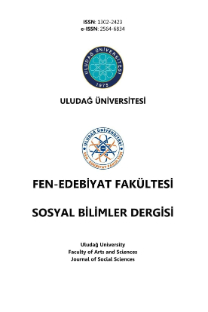Is Post-Modernisma a Tramp for the Developmet?
Post-Modernizm Gelişmek İçin Bir Adım mıdır?
___
- BAGNALL, Richard G. 1998), “Moral Education in a Postmodern World: Continuing professional education”, Journal of Moral Education, Vol. 27 Issue 3, p. 313-32.
- BAUDRILLARD, Jean. (1975), The Mirror of Production, St. Louise.
- BELL, D. (1973), The Coming of Post-Industrial Society, Basic, London.
- BELL, D. (1976), Cultural Contradictions of Capitalism, New York.
- BOLOGH, Roslyn Wallach; MELL, Leonard. (1994) “Modernism, Postmodernism, and The New World (Dis)order: A Dialectical Analysis and Alternative”, Critical Sociology, 1994, Vol. 20 Issue 2, p81, 40p.
- BURGIN, Victor. (1986), The End of Art Theory: Criticism and Post-modernity, London.
- CALLINICOS, Alex. (1990), Against Postmodernism: A Marxist Critique, New York.
- CROOK, S., J. PAKULSKI, M. WATERS. (1992), Postmodernisation, Sage, London.
- DAHRENDORF, Ralf. (1959), Class and Class Conflict In Industrial Society, Stanfodr University Press.
- DERRIDA, Jacque. (1987), The Truth in Painthing, London.
- DIRLIK, Arif, (1999). “Formations of Globality and Radical Politics”, The Review of Education/Pedagogy/Cultural Studies, Vol: 21. No: 4, pp. 301-338
- DIRLIK, Arif. (2002), “Modernity as History: post-revolutionary China, Globalisation and the Question of Modernity”, Social History, Vol: 27, No:1.
- EHRENREICH, B. and J. EHRENREICH. (1977), The Professional Manegiral Class, Radical America, 11(2), p.7-31.
- ETZIONI, Amatai. (1968), Active Society, Free Press, London.
- FEATHERSTONE, M., (1988), "In pursuit of the Postmodern": An Introduction", Theory,, Culture and Society, Special Issue On Postmodenism, ed. M.Featherstone, Vol.5, nos, 2-3. p.195-215.
- FEKETE, John. (1988), (ed.), Life after Post-modernism, London.
- FEYERABEND, Paul. K. (1975), Against Method, London.
- FOUCAULT, Michel. (1984). "What is Enlightenment?" in Paul Rabinow, (ed)., The Foucault Reader, New York: Pantheon Books.
- GIDDENS, A. (1984), The Constitution of Society, Oxford.
- HABERMAS, Jurgen. (1985), "A Philosophico-Political Profile", New Left Review, 151, p.75-105.
- HABERMAS, Jurgen. (1987), A Philosophical Discourse of Modernity, Oxford and Cambridge.
- HABERMAS, Jurgen. (1989) "Modernity: An Incomplete Project," in Hal Foster, (ed)., Postmodern Culture, London: Pluto Press.
- HARVEY, D. (1989), The Condition of Post-modern, Blackwell, Oxford.
- HASSAN, Ihab. (1980), "The Question of Post-modernizm", in, Harry R. Garvin (ed.), Romanticism, Modernism, Post-modernism, Bucknell Review, London, p.117-26.
- JAMESON, Frederic. (1984), "Post-modernism and the Cultural Logic of Capitalism", New Left Review, 146: 53-93.
- KAPOOR, Iian, (2002), “Deliberative Democracy or Agonistic Pluralism? The Relevance of the Habermas-Mouffe for Third World Politics”, Alternatives, 27, 459-487.
- KELLNER, D. (1990), "The Post-modern Turn; Positions, Problems, and Prospects, iç, G.Ritzer (ed.), Frontiers of Social Theoy: The New Styntheses, Colombia University Press, New York, 255-286.
- LASH, S. and J. URRY. (1987), The End of Organized Capitalism, Polity, Cambridge.
- LEMERT, Charles.(2000), “Commentary On Allan And Turner. Sailing In Postmodern Winds: Formal Methods In Uncertain Worlds”, Sociological Perspectives, Fall2000, Vol. 43 Issue 3, p. 387, 12p
- LYOTARD, Jean-François. (1984), The Post-Modern Condition, University of Minneapolis Press.
- MCKINLAY, Patrick F.(1998), “Postmodernism and democracy: Learning from Lyotard and Lefort”, Journal of Politics, May, Vol. 60 Issue 2, p. 481, 22p
- NİC J., Fox. (1998), “Foucault, Foucauldians and Sociology”, British Journal of Sociology, Vol: 49, No: 3, 415-434.
- QUICKE, John. (1999), “The Postmodern Turn: problems and possibilities”, British Journal of Sociology of Education, Vol.20, No: 2.
- ROBERTS, Michael. (2000) “Rethinking the Post-modern Perspectives: Excavating the Kantian System to Rebuild Social Theory”, The Sociological Quarterly, Vol: 41, 681-698.
- ROSE, M. (1991), The Post-Modern and the Post-Industrial, Cambridge University Press.
- SYLVESTER, Christine. (1999), “Development studies and postcolonial studies: disparate tales of the ‘Third World’”, Third World Quarterly, Vol: 20, No. 4, pp. 703-721.
- TATE, John W. (1999). “Posting Modernity to the Past?”, Telos, Issue 115, p. 79-95.
- WATERS, Malcom. (1994), Modern Sociological Theory, Sage, London.
- WEBER, Max. (1968), Economy and Society, New York, Bedminster Press.
- WEBER, Max. (1989), Selections in Transition, W.G.Runciman (ed)., Cambridge University Press.
- WILLIAMS, Alastair (2001), “Adorno and the Semantics of Modernism”, Perspectives of New Music, Summer1999, Vol. 37 Issue 2, p. 29, 22p.
- WOODE, M., (1986), The Retreat from Class: The New "True", Socialism, London, Verso.
- ISSN: 1302-2423
- Yayın Aralığı: 2
- Başlangıç: 1999
- Yayıncı: Bursa Uludağ Üniversitesi
Leadership Perspectives on Turkey's Accession to the European Union
Is Post-Modernisma a Tramp for the Developmet?
Bursa'da Osmanlı Dönemi Karakolhaneleri
XVI. Yüzyıl Divan Şâiri Fedâyî ve Fâl-Nâme-i Kur'ân-ı' Azîm'i
XVI. Yüzyıl Divan Şâiri Fedâyî ve Fâl-Nâme-i Kur'ân-ı' Azîm'i
Martin Hidegger Felsefesinde Ölüm Problemi
Osmanlı Döneminde Bursa'da Eytâm Keseleri
Leadership Perspectives on Turkey's Accession to the European Union
